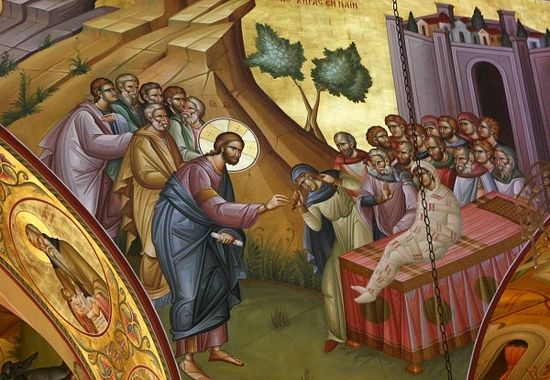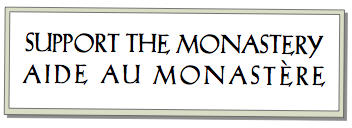+ “Behold, a man who had died was being carried out, the only son of his mother, and she was a widow; and a large crowd from the city was with her. And when the Lord saw her, He had compassion on her and said to her, ‘Do not weep.’ And He came and touched the bier, and the bearers stood still. And He said, ‘Young man, I say to you, arise.’ And the dead man sat up, and began to speak. And He gave him to his mother.”
“He had compassion on her.” This is surely one of the most beautiful incidents in the Gospel—akin to the tears Our Lord shed when faced with the death of his beloved friend Lazarus (Jn 11:35)—for a widowed mother burying her only son was not only suffering a mother’s grief but also the prospect of financial and social destitution. Her copious tears, and no explicit demand, moved Our Blessed Lord to have compassion, to partake in her sorrow and grief, and then to do what He only could do: raise the man to life and to give him back to his mother, thereby giving her back her own life and security.
We live in a hard, cold and efficient world where compassion is often dismissed as sentimental weakness. Impersonal policies and even ideologies dictate the treatment of persons, particularly of those in need or distress. Let us not forget recent history which saw many governments forbid even husbands and wives to be present at each other’s deathbeds and refused them access to the ministrations of priests, in a bid to preserve the bodily health of others whilst people died alone, in great distress if not despair, without even the consolation and fortification of the sacraments.
Even the Church is not immune. This very month of September many individuals, families and parish and religious communities are suffering anew from the glacial imposition of authoritarian policies based on an ideological position that ‘what earlier generations held as sacred, does not remain sacred and great for us too, and must be all of a sudden be entirely forbidden and considered harmful.’ There is no concern for the wellbeing (indeed for the eternal salvation) of those thus disenfranchised. There is no compassion before the tears that those in authority have caused to flow. Rather, there is a heartless and cruel exercise of power by those whose very vocation is to show compassion.
We must resist and do all that we can to counter such abuse, in society and in the Church, with the compassion of Christ—with the compassion of the Cross. For Our Lord was not only deeply moved by the suffering of the widow of Naim, or by the death of Lazarus: He is the very incarnation of the Compassion of Almighty God for all of mankind. His self-sacrifice on the Cross, to the very last drop of His Precious Blood, is the Eternal Sacrifice of Compassion in which He takes upon Himself the sins of the world that they might not destroy us and lead to eternal death, but that we might rise, freed from the burden of their just punishment, to new and everlasting life.
When governments deny access to this sacrifice, particularly to those in extremis, they act beyond their competence and may justly be disobeyed. When ecclesiastical authorities seek to extinguish the very liturgical form of the re-presentation of this sacrifice that has been the beating heart of the Church for more than a thousand years, and which has brought renewed life to her in our own day—particularly amongst the young—their commands are nothing but a loveless “noisy gong or a clanging cymbal” (1 Cor. 13:1) and should be treated as such. The Compassion of the Cross, the Sacrifice of Christ on Calvary and the salvation if offers, is our business—indeed, it must be our first priority. The salvation of souls is the supreme law: prelates’ paltry political preferences and power plays are not.
In the epistle of this Mass St Paul, too, exhorts us to minister the Compassion of Christ: “Brethren, if a man is overtaken in any trespass, you who are spiritual should restore him in a spirit of gentleness. Look to yourself, lest you too be tempted. Bear one another’s burdens, and so fulfil the law of Christ”—an exhortation repeated each day in the monastic Office of Sext. It is instructive. Compassion is gentle, it bears the burdens of another, it is humbly conscious of one’s own frailty, sinfulness and needs. It seeks to restore the one who suffers (even if this is the result of their own wilful wrongdoing) to full spiritual health, forgiving all for the love of Christ.
My brothers and sisters, the Compassion of Our Blessed Lord shown to the widow of Naim and taught by St Paul to the Church in Galatia, and through them to us this morning, is to be our standard. Whilst we may rightly lament, denounce and resist the lack of this compassion in authorities whose duty it is to exercise it (in some situations this may even become a duty), let us look first to ourselves as St Paul advises and, as we participate anew in the Eternal Sacrifice of the Compassion of Almighty God at this altar, let us beg of Him the grace always to be able humbly and lovingly to “bear one another’s burdens, and so fulfil the law of Christ.” +
“He had compassion on her.” This is surely one of the most beautiful incidents in the Gospel—akin to the tears Our Lord shed when faced with the death of his beloved friend Lazarus (Jn 11:35)—for a widowed mother burying her only son was not only suffering a mother’s grief but also the prospect of financial and social destitution. Her copious tears, and no explicit demand, moved Our Blessed Lord to have compassion, to partake in her sorrow and grief, and then to do what He only could do: raise the man to life and to give him back to his mother, thereby giving her back her own life and security.
We live in a hard, cold and efficient world where compassion is often dismissed as sentimental weakness. Impersonal policies and even ideologies dictate the treatment of persons, particularly of those in need or distress. Let us not forget recent history which saw many governments forbid even husbands and wives to be present at each other’s deathbeds and refused them access to the ministrations of priests, in a bid to preserve the bodily health of others whilst people died alone, in great distress if not despair, without even the consolation and fortification of the sacraments.
Even the Church is not immune. This very month of September many individuals, families and parish and religious communities are suffering anew from the glacial imposition of authoritarian policies based on an ideological position that ‘what earlier generations held as sacred, does not remain sacred and great for us too, and must be all of a sudden be entirely forbidden and considered harmful.’ There is no concern for the wellbeing (indeed for the eternal salvation) of those thus disenfranchised. There is no compassion before the tears that those in authority have caused to flow. Rather, there is a heartless and cruel exercise of power by those whose very vocation is to show compassion.
We must resist and do all that we can to counter such abuse, in society and in the Church, with the compassion of Christ—with the compassion of the Cross. For Our Lord was not only deeply moved by the suffering of the widow of Naim, or by the death of Lazarus: He is the very incarnation of the Compassion of Almighty God for all of mankind. His self-sacrifice on the Cross, to the very last drop of His Precious Blood, is the Eternal Sacrifice of Compassion in which He takes upon Himself the sins of the world that they might not destroy us and lead to eternal death, but that we might rise, freed from the burden of their just punishment, to new and everlasting life.
When governments deny access to this sacrifice, particularly to those in extremis, they act beyond their competence and may justly be disobeyed. When ecclesiastical authorities seek to extinguish the very liturgical form of the re-presentation of this sacrifice that has been the beating heart of the Church for more than a thousand years, and which has brought renewed life to her in our own day—particularly amongst the young—their commands are nothing but a loveless “noisy gong or a clanging cymbal” (1 Cor. 13:1) and should be treated as such. The Compassion of the Cross, the Sacrifice of Christ on Calvary and the salvation if offers, is our business—indeed, it must be our first priority. The salvation of souls is the supreme law: prelates’ paltry political preferences and power plays are not.
In the epistle of this Mass St Paul, too, exhorts us to minister the Compassion of Christ: “Brethren, if a man is overtaken in any trespass, you who are spiritual should restore him in a spirit of gentleness. Look to yourself, lest you too be tempted. Bear one another’s burdens, and so fulfil the law of Christ”—an exhortation repeated each day in the monastic Office of Sext. It is instructive. Compassion is gentle, it bears the burdens of another, it is humbly conscious of one’s own frailty, sinfulness and needs. It seeks to restore the one who suffers (even if this is the result of their own wilful wrongdoing) to full spiritual health, forgiving all for the love of Christ.
My brothers and sisters, the Compassion of Our Blessed Lord shown to the widow of Naim and taught by St Paul to the Church in Galatia, and through them to us this morning, is to be our standard. Whilst we may rightly lament, denounce and resist the lack of this compassion in authorities whose duty it is to exercise it (in some situations this may even become a duty), let us look first to ourselves as St Paul advises and, as we participate anew in the Eternal Sacrifice of the Compassion of Almighty God at this altar, let us beg of Him the grace always to be able humbly and lovingly to “bear one another’s burdens, and so fulfil the law of Christ.” +


 RSS Feed
RSS Feed


